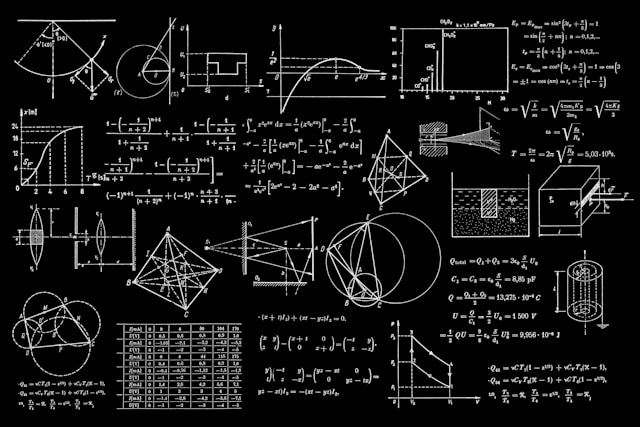When it comes to pursuing higher education, some courses are known to be more challenging than others. These courses require a high level of dedication, critical thinking, and problem-solving skills. In this article, we’ll look at some of the toughest courses in the world, such as medicine, mathematics and more. If you’re pondering about a career in these areas or just want to know more about how tough they can be, join us in this article as we explore the most difficult courses in the world.
Medicine is often considered one of the toughest courses in the world. It requires a vast amount of knowledge and a strong commitment to studying. One of the reasons why medicine is so challenging is the extensive memorization required. Students must learn and remember a wide range of medical terms, diseases, treatments, and procedures.

In addition to memorization, medicine also requires a deep understanding of complex concepts and the ability to apply them in real-life situations. Medical students must learn how the human body functions, how diseases develop, and how to diagnose and treat various conditions.

Furthermore, medicine is a constantly evolving field, with new research and discoveries being made all the time. This means that medical students must stay up-to-date with the latest advancements and be able to adapt their knowledge and skills accordingly. Another aspect that makes medicine challenging is the practical component. Medical students not only have to study theory but also gain hands-on experience through clinical rotations and internships. This requires long hours, dedication, and the ability to handle high-pressure situations.

In short, medicine is a demanding and rigorous course that requires a combination of intelligence, dedication, and perseverance. It is no wonder that it is considered one of the most difficult courses in the world.
Engineering is often considered one of the most difficult courses in the world. It requires students to have tactical skills, analytical skills, critical thinking, and problem-solving abilities. There are various branches of engineering, each with its own level of difficulty. According to a research survey, the top five most difficult engineering courses are chemical, aerospace, biomedical, electrical, and computer engineering.

Chemical engineering is often ranked as the hardest major in this field. It involves the study of chemical processes and the design and operation of chemical plants. Aerospace engineering, on the other hand, focuses on the design and development of aircraft and spacecraft. It is known for its complex mathematical calculations and rigorous technical requirements.

Biomedical engineering is another challenging discipline within engineering. It combines principles of engineering with medical and biological sciences to develop innovative solutions for healthcare. The extensive chemical and biology courses make it particularly difficult. Electrical engineering is also considered one of the most difficult engineering courses. It deals with the study and application of electricity, electronics, and electromagnetism. The concepts and theories involved can be highly complex and require a strong foundation in mathematics and physics.

Computer engineering is another demanding field that combines elements of electrical engineering and computer science. It involves the design and development of computer systems and hardware. The rapid advancements in technology make it challenging for students to keep up with the latest developments. Computer engineering is vital in the age of AI, making it a crucial course of study for students today.
While engineering as a whole is challenging, it is important to note that the difficulty level can vary depending on the individual’s strengths and interests. Some students may find certain branches of engineering more difficult than others based on their aptitude and passion for the subject.
Physics is often considered one of the most difficult courses in the world. It requires a deep understanding of complex mathematical concepts and the ability to apply them to real-world situations. One of the toughest fields in physics is quantum field theory (QFT). It combines principles from quantum mechanics and special relativity to study the behavior of particles and fields. Mastering QFT requires a strong foundation in both of these fields.

Another challenging area of physics is astrophysics. This branch of physics deals with the study of celestial objects and the universe as a whole. It involves complex calculations and theories to understand the formation and evolution of galaxies, stars, and planets.

Electrodynamics is also known to be a difficult subject in physics. It focuses on the study of electric and magnetic fields and their interactions. Understanding the laws and equations of electrodynamics can be quite challenging. In addition to these specific fields, physics as a whole requires a high level of mathematical proficiency. Advanced mathematics, such as calculus and differential equations, are essential tools for solving complex physics problems.

Physics is a demanding course that requires a combination of mathematical skills, critical thinking, and problem-solving abilities. It is no wonder that it is often considered one of the most difficult courses in the world.
Mathematics is often considered one of the most difficult courses in the world. It requires a deep understanding of abstract concepts and rigorous problem-solving skills. One of the toughest math courses is Honors Abstract Algebra. This course delves into advanced algebraic structures and theories, challenging students to think abstractly and prove complex theorems.

Another challenging math course is History of Math. This course explores the development of mathematical concepts throughout history and requires students to analyze and understand various schools of thought.
Math 55, offered at Harvard University, is often regarded as one of the most difficult undergraduate math classes in the country. It covers a wide range of advanced topics and pushes students to their limits. Advanced calculus, abstract algebra, and topology are also known to be extremely challenging math courses. These courses require a high level of mathematical maturity and problem-solving skills. Universities such as Massachusetts Institute of Technology (MIT) and Cambridge University are renowned for their rigorous math programs and offer some of the most difficult math courses in the world.

In short, mathematics courses demand a strong foundation in mathematical concepts, critical thinking abilities, and perseverance to tackle complex problems. It is no wonder that mathematics is considered one of the most difficult courses in the world.
Computer Science is one of the most challenging and demanding fields of study in the world. It requires a deep understanding of algorithms, programming languages, data structures, and computer systems. One of the hardest classes in the Computer Science curriculum is the “Mathematical Theory of Computation.” This course delves into the mathematical foundations of computer science, including formal languages, automata theory, and computational complexity. It requires a strong background in mathematics and logical reasoning.

Another difficult course in Computer Science is Data Mining and Machine Learning. This class explores advanced techniques for extracting knowledge from large datasets and building predictive models. It involves complex algorithms, statistical analysis, and programming skills.

Operating Systems is another challenging course in Computer Science. It covers the design and implementation of operating systems, including process management, memory management, and file systems. Students need to have a solid understanding of computer architecture and programming. Computer Networks is also considered a difficult course. It focuses on the design and implementation of network protocols, routing algorithms, and network security. It requires a deep understanding of networking concepts and protocols.

In addition to these specific courses, Computer Science as a whole is a demanding field that requires continuous learning and keeping up with the latest advancements. The rapid pace of technological innovation makes it necessary for computer scientists to constantly update their skills and knowledge.

Computer Science is a challenging discipline that requires a combination of analytical thinking, problem-solving skills, and technical expertise. It is not for the faint-hearted, but for those who are passionate about technology and eager to push the boundaries of what is possible.
Law is considered one of the most difficult courses in the world. It presents numerous challenges that require critical thinking, analytical skills, and a deep understanding of complex legal concepts. In the United States, one of the toughest law classes is Federal Civil Procedure. This course delves into the rules and procedures that govern civil lawsuits, requiring students to navigate through intricate legal frameworks.

Constitutional Law, Tax Law, and Evidence Law are also known to be grueling courses in the field of law. Each of these courses has its own unique set of challenges and factors that contribute to their difficulty. Studying law involves extensive reading and research, as there is a plethora of literature available for students to study and pursue these courses. The workload can be overwhelming, requiring students to manage large volumes of case studies, statutes, and legal precedents.

Moreover, law students are expected to develop strong analytical and problem-solving skills. They must be able to analyze complex legal issues, apply legal principles to real-life scenarios, and construct persuasive arguments. Law school also places a heavy emphasis on critical thinking and logical reasoning. Students are often required to engage in rigorous debates, analyze legal precedents, and interpret statutes to arrive at well-reasoned conclusions.

Additionally, the competitive nature of the legal profession adds to the difficulty of studying law. Law students are constantly challenged to outperform their peers and secure top positions in their class. This pressure can be mentally and emotionally demanding.
In short, law is a demanding and intellectually rigorous field of study. It requires dedication, perseverance, and a strong passion for justice. While it may be challenging, the rewards of a legal career can be highly fulfilling for those who are willing to put in the effort.
Architecture is often considered one of the most difficult courses in the world. It requires a unique combination of creativity, technical skills, and critical thinking. One of the main challenges in architecture is the extensive workload. Students are required to complete numerous design projects, research papers, and presentations. These projects often require long hours of work and attention to detail.

Another difficulty in architecture is the complexity of the subject matter. Architecture involves a deep understanding of structural engineering, building materials, environmental systems, and design principles. Students must learn how to integrate all these aspects into their designs while considering factors such as sustainability, functionality, and aesthetics.
Additionally, architecture courses often involve hands-on studio work. Students spend a significant amount of time in design studios, where they work on creating physical models, drawings, and digital renderings. This requires a high level of technical skill and the ability to effectively communicate ideas through visual representations.

Furthermore, architecture programs often have a competitive and rigorous curriculum. Students are constantly challenged to push their creative boundaries and think outside the box. They are expected to come up with innovative and unique design solutions that meet the needs of clients and the community.

Lastly, the field of architecture is constantly evolving. New technologies, materials, and design trends emerge regularly, and architects must stay updated with these advancements. This requires a lifelong commitment to learning and professional development.
In conclusion, architecture is a demanding and challenging course that requires a combination of creativity, technical skills, and critical thinking. The extensive workload, complexity of the subject matter, hands-on studio work, competitive curriculum, and the need for continuous learning make it one of the most difficult courses in the world.
In conclusion, the world is filled with a wide range of challenging and difficult courses that require dedication, hard work, and a strong passion for the subject matter. These courses push students to their limits and demand a high level of commitment and perseverance.
Students who choose to pursue these most difficult courses in the world often find themselves on a rewarding and fulfilling path, as they develop valuable skills and knowledge that can be applied in various professional settings. While these courses may be challenging, they also offer great opportunities for personal and intellectual growth. The skills and knowledge gained from these courses can open doors to exciting career prospects and contribute to the advancement of society as a whole.
It is important to note that the difficulty of a course is subjective and can vary depending on individual strengths and interests. What may be difficult for one person may come naturally to another. Therefore, it is crucial for students to choose a course that aligns with their passions and strengths, as this will greatly enhance their chances of success and satisfaction. In short, these most difficult courses in the world challenge students to think critically, solve problems, and push the boundaries of knowledge. They are not for the faint of heart, but for those who are willing to put in the effort, the rewards are immeasurable.